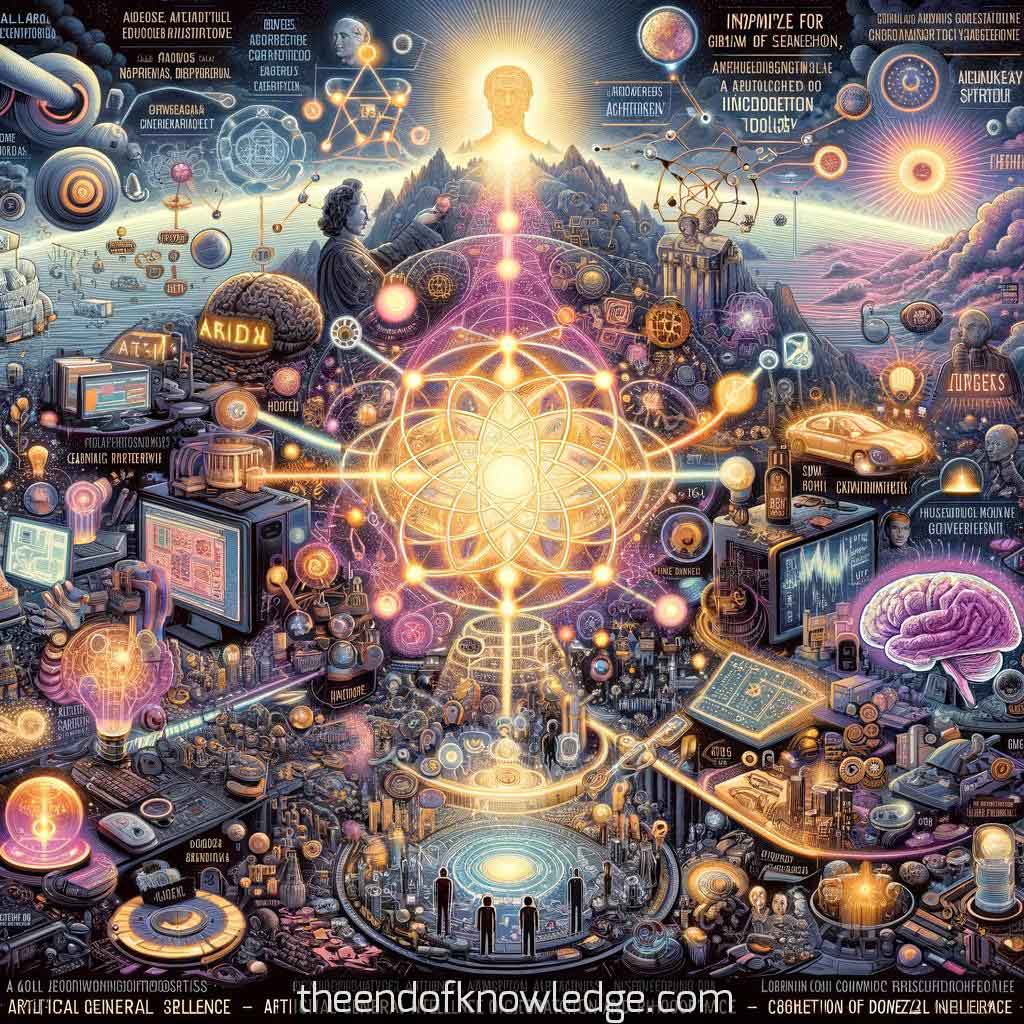 >
>
Concept Graph (using Gemini Ultra + Claude3):
Custom ChatGPT resume of the OpenAI Whisper transcription:
1.- Ben Goertzel is a prominent figure in artificial intelligence, founding SingularityNet and designing the OpenCog AI Framework. He has played a central role in the AGI community, contributing to and organizing the Conference on Artificial General Intelligence.
2.- Goertzel's interest in AI and science fiction was sparked by the original Star Trek TV show, leading him to explore the science fiction literature extensively. This early exposure influenced his career path into AI research and development.
3.- Influential science fiction writers for Goertzel included Stanislaw Lem and Philip K. Dick. Lem's exploration of superhuman AIs and the concept of intelligence beyond human understanding had a significant impact on Goertzel's views on AGI.
4.- Goertzel discusses the concept of intra-particulate intelligence (SIPI), suggesting the possibility of advanced intelligences existing at a sub-quantum level, undetectable to humans. This idea reflects Goertzel's broad perspective on potential forms of intelligence.
5.- He emphasizes the importance of expanding human intelligence and mind to possibly understand and perceive advanced forms of intelligence around us, suggesting that humanity might only be a small part of a much larger, intelligent system.
6.- Goertzel's fascination with AGI is driven by both a desire to transcend human limitations and the potential to alleviate human suffering and mortality. This dual motivation underscores the transformative potential he sees in AGI.
7.- The influence of thinkers like Dostoevsky and Nietzsche on Goertzel highlights his interest in the philosophical and existential aspects of intelligence, consciousness, and the future of humanity.
8.- Goertzel shares his perspective on the nature of human intelligence and morality, suggesting a balance between individual and group selection, which shapes our altruistic and selfish behaviors.
9.- His discussion on the potential for societal improvement and the role of AGI in achieving a more positive, compassionate existence reflects his optimistic view on technology's capacity to enhance human life.
10.- Goertzel's background, including his family's intellectual history and his early exposure to advanced concepts in physics and computing, laid the foundation for his career in AI and his visionary outlook on the future of intelligence.
11.- Goertzel articulates his disillusionment with the AI academic field during his early career, finding it focused on rule-based expert systems, which he deemed boring and misguided. This pushed him towards seeking more dynamic, learning-based approaches to AI.
12.- Discovering John Andreas's work on PURPUS, a reinforcement learning system aimed at AGI through a Markov decision process, Goertzel highlights the isolated yet foundational efforts in academia that intrigued him, despite their scarcity.
13.- He notes the contributions of early, scattered researchers in AI, mentioning John Andreas and John Cleary, and their influence on the development of Weka, the first open-source machine learning toolkit, indicating a lineage of ideas contributing to modern AGI efforts.
14.- Goertzel recounts organizing the first AGI workshop in 2006, emphasizing the evolution of the AGI community from a small group of enthusiasts to a larger, more formal assembly. This shift underscores the growing recognition and ambition within the AGI field.
15.- He contrasts the early days of AGI research, where discussing AGI in academic settings was unconventional, with the present, where AGI is recognized by national leaders and tech giants, indicating a significant shift in the acceptance and ambition surrounding AGI.
16.- Goertzel reflects on the dichotomy within AI research between cognitive architectures and learning theories, advocating for a synthesis of these approaches to advance towards AGI.
17.- The evolution of OpenCog, an open-source software project for AGI development, is discussed. Goertzel outlines its inception, development, and the challenges faced in integrating diverse AI methodologies within a cohesive framework.
18.- OpenCog's Atom Space, a core component, is a weighted labeled hypergraph designed for flexible, dynamic knowledge representation, facilitating the integration of various AI paradigms.
19.- The discussion delves into the practical challenges of implementing AGI, emphasizing the need for scalable, efficient architectures capable of representing and manipulating complex knowledge structures.
20.- Goertzel expresses enthusiasm for graph processors and their potential to accelerate OpenCog-type architectures, highlighting the hardware and software innovations necessary for advancing AGI research.
21.- The conversation explores the potential of neuromorphic computing and its implications for AGI, emphasizing the importance of hardware advancements in realizing complex cognitive architectures.
22.- A deep dive into OpenCog’s cognitive architecture reveals the intricate balance between different types of knowledge representation, including declarative, procedural, and episodic knowledge, within a unified framework.
23.- Goertzel emphasizes the beauty of finding a common representation for diverse types of knowledge within AGI systems, underlining the significance of interoperability among learning algorithms and knowledge types.
24.- The intricacies of OpenCog's type system are discussed, highlighting its ability to accommodate a wide range of knowledge forms, from logical to sensory, within a hypergraph structure.
25.- Goertzel outlines the cognitive algorithms operating within OpenCog, explaining how they contribute to the system's ability to dynamically modify and grow its knowledge base.
26.- The conversation touches on the future of AGI development, stressing the importance of integrating various AI approaches and learning from the limitations and successes of current methodologies.
27.- Goertzel reflects on the philosophical and technical challenges of creating AGI systems that can effectively integrate and leverage different forms of knowledge and learning processes.
28.- The potential of OpenCog to model complex cognitive processes and represent a diverse array of knowledge types within a single framework is highlighted as a key advantage in the pursuit of AGI.
29.- Goertzel discusses the importance of developing hardware specifically tailored to support the unique requirements of AGI architectures, such as graph processors, to overcome current computational bottlenecks.
30.- The interview concludes with Goertzel articulating his vision for AGI, focusing on the convergence of cognitive architectures, learning theories, and hardware advancements to create systems capable of human-like intelligence and beyond.
Interview byLex Fridman| Custom GPT and Knowledge Vault built byDavid Vivancos 2024